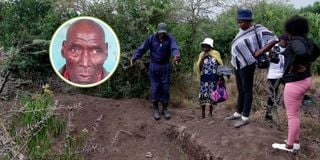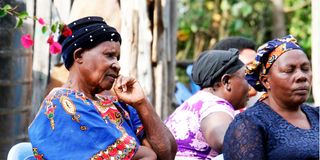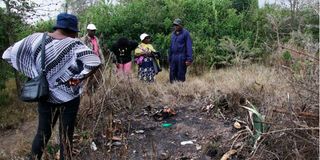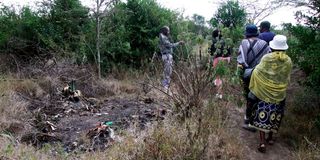Breaking News: Former Lugari MP Cyrus Jirongo dies in a road crash

Inset: A portrait of the late Mzee Joseph Ndegwa. Main picture: Mzee Ndegwa's family members at the site where investigators dug a shallow grave in search of his remains.
The night of June 25, 2024, was normal for octogenarian Joseph Ndegwa, alias Ole Sota.
After imbibing his favourite drink, he sauntered out of a bar he frequented at Chuma market and rode on a motorcycle towards his home, some 500 metres away.
That was the last time Ndegwa, 81, a widower, who lived with his son at Njoguini village in Laikipia County, was seen alive.
His whereabouts had remained a mystery until three bones were collected from his homestead and subjected to DNA tests.

Eunice Muhindi, a grand daughter of the late Mzee Joseph Ndegwa, during an interview in Njoguini village, Laikipia County, on September 24, 2024. The deceased went missing in June, and DNA tests later confirmed that the bones found on his farm belonged to him. J
The results? He was dead under unclear circumstances.
A few days after the former coffee factory manager went missing, his 56-year-old son was arrested as the prime suspect, and he reportedly confessed to detectives that he had killed his father, and buried him in a shallow grave within the compound.
According to the family and locals, the father and son, who lived in a three-roomed timber house, were in constant quarrel over the family estate.
In his confession, Mr Anthony Gitonga, a senior bachelor, told detectives that his father was planning to sell part of the family land, and had recently sold the family cow at Sh41,000 against his wishes.
This alleged confession prompted the Directorate of Criminal Investigation (DCI) and homicide detectives to visit the homestead for the exhumation exercise on July 15, 2024, after obtaining a court order.
The home, which stands on a four-acre parcel, had by then been declared a crime scene and was under 24-hour surveillance by armed police officers.

Mourners at the home of the late Mzee Joseph Ndegwa, at Njoguini village, Laikipia County, on September 24, 2024. The deceased went missing in June, and DNA tests later confirmed that the bones found on his farm belonged to him.
However, efforts to retrieve the body turned out to be a wild goose chase and after digging out two feet on the purported grave, nothing was found.
“There were about 100 government officers, including from the public health and homicide detectives, who conducted the exhumation exercise,” recalls Ms Jeniffer Mungai, a daughter of the deceased.
“Only family members were present and with every shoveling of the soil, we held our breaths in anticipation, but it turned out that my brother had lied to the detectives about a shallow grave.”
Shallow grave
Next to the purported shallow grave were some pieces of burnt clothes and shoes, but there were no signs of human flesh.
“Before the exhumation exercise, I had visited my brother at Ngobit Police Station, where he was being held and he confided in me that he had burned the body and what was buried at the said shallow grave were some bones but police found nothing. Some three bones were discovered within the compound having been nibbled by stray dogs,” explained Ms Mungai.
Following the futile search for the remains, detectives and family members turned to the three bones to unravel the fate of the family’s patriarch though by appearance, they were parts of a human skeleton.
Detectives took the bones to the Government Chemist for DNA analysis and on September 15, 2024, the family’s fears were confirmed— the remains were indeed those of their missing kin.
As the family contemplated the burial plans, the next hard task was to search for more remains of the body within the compound.

Family members of the late Mzee Joseph Ndegwa at a burnt site next to a shallow grave in Njoguini village, Laikipia County, on September 24, 2024. The 80-year-old man went missing in June, and DNA tests later confirmed that the bones found on his farm belonged to him.
“We liaised with government officers and neighbours in the search for more remains and after combing six neighbouring bushy farms for five hours, we collected three more bones bringing the total number to six,” said Ms Eunice Muhindi, Mzee Ndegwa’s granddaughter.
“The bones, all measuring less than two feet, were handed over to the police and are currently preserved at the Nanyuki Teaching and Referral Hospital Mortuary.”
The bones will be placed in a casket and the family says they will conduct a burial ceremony for closure since DNA tests had confirmed that he had died. It brings to an end a three-month search, albeit sadly, but still a relief to the anxious family.
Stray dogs
Ms Muhindi said as they prepare to conduct the unique burial ceremony, the family is still heartbroken by the turn of events and fearful they may never know what happened on the fateful day even as they give the family patriarch a “decent burial” to rest in peace and not in pieces.
“Now that there are no doubts that stray dogs feasted on my grandfather’s remains, our biggest fear is what happens in case more bones are discovered in the coming days in the neighbouring farms. It would be traumatising to be called by a villager asking us to go and collect some more bones after we are done with the burial ceremony, and we would not know what to do with them,” said Ms Muhindi.

Family members of the late Mzee Joseph Ndegwa at a burnt site next to a shallow grave in Njoguini village, Laikipia County, on September 24, 2024. The 80-year-old man went missing in June, and DNA tests later confirmed that the bones found on his farm belonged to him.
Mr Gitonga is currently in remand prison after being charged at the Nanyuki High Court with the murder of his father.
The accused pleaded not guilty to the charges and the trial is set to commence on October 16, where the prosecution is expected to present evidence linking him to the murder of his aging father.
According to a senior detective involved in the probe of the murder case, who spoke in confidence since the matter is already before court, the DCI has collected sufficient evidence to convict the suspect.
“The fact that ODPP (Office of the Directorate of Public Prosecution) gave as a nod to proceed with the trial after subjecting the suspect to the mandatory psychiatric test is an indication that we have sufficient grounds to link him to the murder,” said the officer without revealing details on how the octogenarian met his death.
The family said they had forgiven their kin but had left him to carry his cross and would not offer him any kind of support as he fought his court battles.
“We have left everything to God and will let the law take its course in pursuit of justice for our father who did not deserve to die in such a cruel way. If he is found guilty and jailed, justice will have been served rightfully,” says Ms Mungai.








